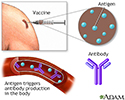Preventing hepatitis A
Hepatitis A is inflammation (irritation and swelling) of the liver caused by the hepatitis A virus. You can take several steps to prevent catching or spreading the virus.
Handwashing
To reduce your risk of spreading or catching the hepatitis A virus:
- Always wash your hands thoroughly after using the restroom and when you come in contact with an infected person's blood, stools, or other bodily fluid.
- Avoid unclean food and water.
The virus may spread quickly through day care centers and other places where people are in close contact. To prevent outbreaks, wash hands well before and after each diaper change, before serving food, and after using the restroom.
Avoid unclean food and water
You should take the following precautions:
- Avoid raw shellfish.
- Beware of sliced fruit that may have been washed in contaminated water. Travelers should peel all fresh fruits and vegetables themselves.
- Do not buy food from street vendors.
- Use only carbonated bottled water for brushing teeth and drinking in areas where the water may be unsafe. (Remember that ice cubes can carry infection.)
- If no water is available, boiling water is the best method for eliminating hepatitis A. Bringing the water to a full boil for at least 1 minute generally makes it safe to drink.
- Heated food should be hot to the touch and eaten right away.
If you are Exposed
If you were recently exposed to hepatitis A and have not had hepatitis A before, or have not received the hepatitis A vaccine series, ask your health care provider about receiving a hepatitis A immune globulin shot.
Common reasons why you may need to receive this shot include:
- You live with someone who has hepatitis A.
- You recently had sexual contact with someone who has hepatitis A.
- You recently shared illegal drugs, either injected or non-injected, with someone who has hepatitis A.
- You have had close personal contact over a period of time with someone who has hepatitis A.
- You have eaten in a restaurant where food or food handlers were infected or contaminated with hepatitis A.
You will likely get the hepatitis A vaccine at the same time you receive the immune globulin shot.
Vaccines
Vaccines are available to protect against hepatitis A infection. Hepatitis A vaccination is recommended for all children older than age 1.
Hepatitis A vaccination
All content below is taken in its entirety from the CDC Hepatitis A Vaccine Information Statement (VIS): www. cdc. gov/vaccines/hcp/current-vis/hepat...

The vaccine begins to protect 4 weeks after you receive the first dose. A 6- to 12-month booster is required for long-term protection.
People who are at higher risk for hepatitis A and should receive the vaccine include:
- People who use recreational injectable or non-injectable drugs
- Health care and laboratory workers who may come in contact with the virus
- People who have chronic liver disease
- People who have HIV
- Military personnel
- Men who have sex with other men
- Caretakers in day care centers, long-term nursing homes, and other facilities
- Dialysis patients and workers in dialysis centers
- People who are experiencing homelessness
- Close, personal contact with international adoptee (for example, household or regular babysitting) in first 60 days after arrival from country with high or intermediate rate of hepatitis A
Travelers
People who work or travel in areas where hepatitis A is common should be vaccinated. These areas include:
- Africa
- Asia (except Japan)
- The Mediterranean
- Eastern Europe
- The Middle East
- Central and South America
- Mexico
- Parts of the Caribbean
If you are traveling to these areas in fewer than 4 weeks after your first shot, you may not be fully protected by the vaccine. You can also get a preventive dose of immunoglobulin (IG).
References
Kroger AT, Pickering LK, Mawle A, Hinman AR, Orenstein WA. Immunization. In: Bennett JE, Dolin R, Blaser MJ, eds. Mandell, Douglas, and Bennett's Principles and Practice of Infectious Diseases. 9th ed. Philadelphia, PA: Elsevier; 2020:chap 316.
Murthy N, Wodi AP, Bernstein H, McNally V, Cineas S, Ault K. Advisory Committee on Immunization Practices recommended immunization schedule for adults aged 19 years or older - United States, 2022. MMWR Morb Mortal Wkly Rep. 2022;71(7):229-233. PMID: 35176010 pubmed.ncbi.nlm.nih.gov/35176010/.
Pawlotsky JM. Acute viral hepatitis. In: Goldman L, Cooney KA, eds. Goldman-Cecil Medicine. 27th ed. Philadelphia, PA: Elsevier; 2024:chap 134.
Sjogren MH, Cheatham JG. Hepatitis A. In: Feldman M, Friedman LS, Brandt LJ, eds. Sleisenger and Fordtran's Gastrointestinal and Liver Disease. 11th ed. Philadelphia, PA: Elsevier; 2021:chap 78.
Wodi AP, Murthy N, Bernstein H, McNally V, Cineas S, Ault K. Advisory Committee on Immunization Practices recommended immunization schedule for children and adolescents aged 18 years or younger - United States, 2022. MMWR Morb Mortal Wkly Rep. 2022;71(7):234-237. PMID: 35176011 pubmed.ncbi.nlm.nih.gov/35176011/.
Hepatitis A immunization (vaccine) - illustration
Immunization is a process to initiate or augment resistance to an infectious disease. The goal of immunization is to prevent, and in some cases eradicate, potentially serious, life-threatening diseases.
Hepatitis A immunization (vaccine)
illustration
Review Date: 8/8/2023
Reviewed By: Michael M. Phillips, MD, Emeritus Professor of Medicine, The George Washington University School of Medicine, Washington, DC. Also reviewed by David C. Dugdale, MD, Medical Director, Brenda Conaway, Editorial Director, and the A.D.A.M. Editorial team.


